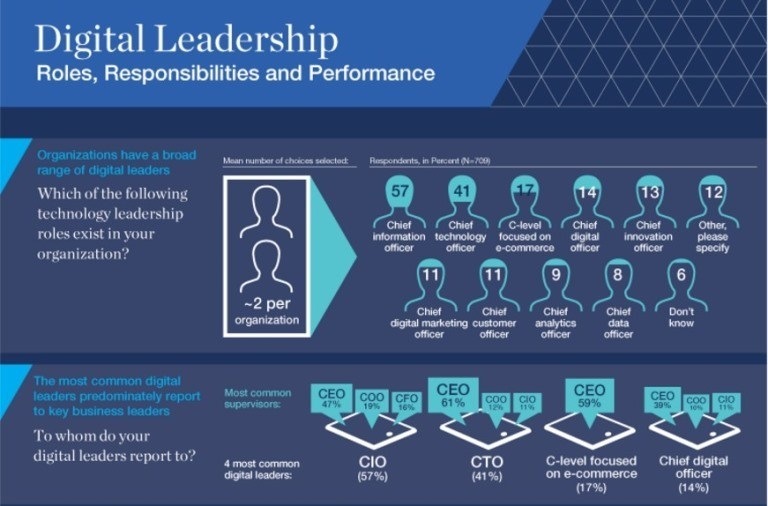The challenges of leadership and digital disruption

The pace of digital disruption has left 50 per cent of businesses and public sector organisations fearful or worried that their organisations will not be able to keep up with what is still to come over the next five years.
As technology continues to transform business models, a new breed of corporate leader is emerging who is digitally-savvy and assiduously curious. Rather than fearing change and obsessively trying to retain control, the most accomplished CEOs accept that for an organisation to compete globally and attract and retain the best talent, they must be highly collaborative, operationally focused and ruthlessly strategic.
It is not enough for businesses to simply be aware of digital advance they must interpret what these could mean for them and how they might benefit. Senior executives of large incumbent organisations have many legitimate concerns and questions about the opportunity that digital presents.
Whether due to unclear monetisation models, baffling market valuations, inflexible IT systems or never-ending jargon and predictions, digital can certainly seem disruptive, and not always in a positive sense.
Despite a sea of uncertainty, it is becoming evident that organisations that successfully leverage digital technologies for new growth operate with a different set of rules and capabilities, and see a greater return also.
Below is a list of seven critical management concerns:
1. Sense and interpret disruption
Merely sensing change is not enough. The trick is to interpret what these changes mean to the business and, more importantly, when they will have an impact.
If business leaders are unable to interpret these change signals, they are no better placed than those who did not see change coming. Research shows that half of business leaders expect competitors to change at least some part of their business model.
The key question is: What will these new business models be, and when will they become relevant?
2. Experiment to develop and launch new ideas more quickly
Ask most entrepreneurs about how they innovate and they may look nonplussed. Most digital disrupters do not see themselves as “innovating”, per se.
In their minds, they are solving specific customer problems the best way they know how. As such, innovation is a consequence, not a goal.
Solving customer problems requires two actions: experimenting more and learning to self-disrupt. Digital technologies enable a new way of experimenting at almost an unlimited scale.
3. Fully understand and leverage data
Businesses hold almost unimaginable amounts of data, and are grappling with how to use it to develop new products and services that bring new value to their customers.
Mastering the art of exploiting data, not only by turning it into useful information, but also by finding new ways to monetise it, will be fundamental to how businesses run in the future.
4. Build and maintain a high digital quotient team
While IQ and EQ measure intellectual and emotional intelligence respectively, the time is ripe for “DQ” ‒ a measure of the digital quotient (or digital savviness) of organisations. As companies evolve their digital capabilities, they need to measure and rapidly build their teams’ DQ ‒ not least among their senior members.
Some organisations are pursuing a strategy of “acqu-hiring” ‒ buying the right skills through acquisitions of technology start-ups, or by establishing formal relationships with the start-up community.
5. Partner and invest for all non-core activities
One of the characteristics of effective digital leaders is their intuitive understanding that the journey is not one to be undertaken alone. A recent report that I read indicated that companies will be increasing their partnerships and alliances as they attempt to boost digital growth in the next three years.
Whether looking for new application programming interfaces (APIs), corporate development or business development partners, aligning with an ecosystem of partners is critical to digital progress.
The more they invest in others, the more organisations extend the team that is as vested in their success as they are.
6. Organise for speed
Two elements are essential for businesses to be organised for speed: according to “digital leader” aspirants, the first is CEO-level support and the presence of a dedicated central team to drive new digital growth.
The second is a team of “fixers” ‒ those at the centre of operations who are independent, respected and can draw on the right skills at the right time.
Many organisations are establishing the role of chief digital officer (CDO) ‒ a sound choice when that person also has the power to drive change and has responsibilities that are distinct from the chief information officer (CIO), chief risk officer (CRO) and chief marketing officer (CMO).
New structures are emerging to help organisations respond more quickly to digital change. Banks have partnered with accelerators that help bring new ideas, while many retailers have set up venture funds to access disrupters.
Other companies have acquired digital teams to enhance their internal capabilities, often funding entrepreneurs who know little about their industry to create a start-up that could seriously hurt their respective businesses.
This counterintuitive process can reveal some implicit industry assumptions that are holding back the business.
7. Design a delightful customer experience
Customers’ primary motivation for repeat business is the quality of their experience. Digital technologies have reset expectations here.
Today, a banking customer using a mobile banking app does not compare it with apps from other banks, but against their best mobile user experiences for usability or functionality, whatever the industry.
It’s important that organisations put the customer at the heart of their business and stand in their shoes when designing beautiful customer experiences.
Digital technology has already broken down the old, familiar business models but the effect it will have on the future of organisations’ operations as it evolves remains significant and unknown. So, CEO’s and business leaders are rightly concerned about keeping up with speed and objectives.

Embrace the change, or get left behind
While executives do not necessarily need to be literate in coding, it is imperative that they understand the role that digital technology plays in a modern organisation, especially if they are to realise the benefits of optimised productivity, efficiency and responsiveness to customers. In fact, nine out of 10 senior decision makers say digital technology is essential to a business’s future success.
Meeting customer expectations before someone else does
Delivering good customer service has become more challenging due to an overwhelming consensus that digital, and a hyper-connected society, has changed customers’ expectations. Business must adapt the way they do things to keep up.
Business to business organisations that may not have originally seen these consumer-focused demands as relevant to them are also feeling the pull, increasingly citing digital media as being very important from the perspective of recruiting talent, engaging colleagues and disseminating and sharing information across teams. As a modern day leader it’s critical to understand not only what technology exists, but how to utilise it to satisfy consumers’ and employees’ ever increasing expectations to drive a competitive advantage.
A modern workforce is a collaborative workforce
With the increase in the use of digital tools for working, boundaries are blurring and businesses are becoming more agile. To enable collaborative working, CEOs are turning to their CIOs, CROs and CDOs to make use of technology to achieve this.
By taking a more collaborative approach with all leaders in the business, digital can be used to transform business processes. By reaching out to the wider team, the CEO can unearth processes and areas of the business that could become more efficient and effective through digital technology, such as customer service and workflow management.
Digital is an enabler, not a disrupter
Having acknowledged that digital technology will play a central role in future success, business leaders cannot afford to show fear of, or reluctance to implement it. Instead they must lead by example, embracing technology with a clear view of the potential advantages to be unlocked.

Using technology to meet the rising expectations from the consumer is a must in today’s marketplace. Business leaders need to first understand what customers expect and then make best use of the available technology to meet their customers’ needs.
By embracing technology and using it in an innovative way, business leaders will be better positioned to maintain a competitive advantage by driving innovation, productivity and efficiency throughout the business.
Finally, when leaders move toward improving their observable behaviors, they have the extraordinary ability to positively influence employees to willingly become engaged. That’s a powerful investment that pays dividends not only in developing good people, but by directly affecting the organisation’s bottom line.
My conclusion is that leadership in today’s world is a balanced mix of universal characteristics and digital leadership traits which has the potential to guide us through years of transformation with optimism and idealism. Technology continues to prove that it can be used for the benefit of mankind, but only if we set sail on the right course and with smart individuals that make our journey, progress, and performance so much worthwhile.
As Robin S. Sharma once said:
By seizing the opportunities that disruption presents and leveraging hard times into greater success through outworking/outinnovating/outthinking and outworking everyone around you, this just might be the richest time of your life so far.
"""
Articles from Geoff Hudson-Searle
View blog
It seems like every day there is a new article or story about artificial intelligence (AI). AI is go ...

A recent publication by Business Mondays, published a recent interview on Geoff Hudson-Searle, that ...

It was with real Joy that we celebrated the launch of Scars to Stars volume 3. · Scars to Stars™ is ...
Related professionals
You may be interested in these jobs
-
Finance Manager
Found in: Jooble UK O C2 - 1 week ago
Hays Senior Finance Bristol, United KingdomA highly regarded and very successful firm of accountants, with offices in Bristol, is seeking to recruit an experienced Corporate Finance Manager. · The successful candidate will be a high achiever, ACA/ACCA qualified, or equivalent corporate finance experience, and ideally hav ...
-

Manager - Product Manager
Found in: Jooble UK O C2 - 4 days ago
Knewin London, United KingdomThey havedeveloped into one of the most compellingand dynamic independent sports betting suppliers in the industry, the Company'smission is to become the leading mainstream sports betting provider with a reputationfor building high quality, bespoke and innovative products for its ...
-
Joiner
Found in: Click to Hired UK C2 - 1 week ago
We Build Recruitment Gillingham, United Kingdom Contract, Full timeWe Build Recruitment are looking for a Carpenter to start ASAP in Gillingham. · This carpentry role will consist of 1st and 2nd fix on a car showroom refurb. · For this role you will need to have a blue or gold CSCS Card, full 5 point PPE and your own tools. · The rate for this j ...


Comments
Geoff Hudson-Searle
6 years ago #6
thank you Debasish Majumder for your wonderful comments. Have a lovely week.
Geoff Hudson-Searle
6 years ago #5
thankyou CityVP \ud83d\udc1d Manjit for your wonderful comments. I have written much on the subject of leadership with IQ and incrorporating the balance of EI. There are some very interesting reseach reports on employee engagement and the use of such intelligence, i have also practiced my balance of IQ/EI in corporate management, which has seen interesting effects on others and importantly across increased productivity and collaboration. I enjoyed hearing your views, have a great week!
Geoff Hudson-Searle
6 years ago #4
Many thanks for your views and thank you for your comments, all of which are abundantly true, the real point is how you apply this data to our everyday lives. have a lovely week.
Debasish Majumder
6 years ago #3
CityVP Manjit
6 years ago #2
Mohammed Abdul Jawad
6 years ago #1